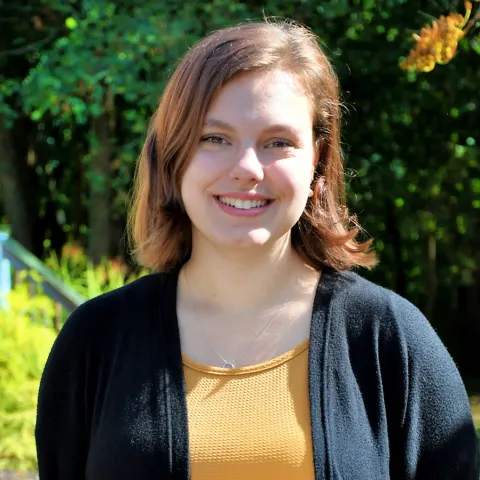
Lydia Pinard ’22
Addressing the challenges faced by a warming Gulf of Maine
Over the course of the last decade, the Gulf of Maine has warmed faster than 99% of the global ocean. Much research has been carried out into the impact this rapid warming is having on commercial species, but few studies have been done to understand why the Gulf of Maine is heating up at such an alarming rate. Lydia Pinard ’22, a Marine Biology major, hopes to change this. Lydia is currently conducting a research project calculating the average decadal temperature increase of 6 buoys evenly distributed throughout the Gulf of Maine—the first step in ultimately calculating the heat content of the Gulf of Maine, which has never been done before.
“I have always loved the ocean, and the idea of studying the ocean appealed to me from an early age. I also knew I was interested in climate change, as it is probably the most defining environmental and social challenge of my lifetime. In high school I worked with the Sierra Club on issues of climate change, including ocean acidification. I knew that UNE had a very strong, nationally recognized School of Marine Programs, but I didn’t know much about research options within those programs. When I arrived at UNE, I learned about the different labs in the Marine Sciences program and attended a seminar where different professors in the program spoke about their research and research opportunities. It was then that I realized I wanted to conduct some kind of research into climate change and its impact on ocean ecosystems.”
Lydia reached out to Dr. Charles Tilburg, UNE’s director of the School of Marine Programs, as well as director of the Arthur P. Girard Marine Science Center and a professor of Marine Sciences, who assisted her with setting up her research project. “The goal of the project is to determine why the Gulf of Maine is warming faster than 99% of the global ocean, how this is affecting the ecosystems within and surrounding the Gulf of Maine, and if there's anything we can do to reduce the impacts of this warming,” explains Lydia. Her first year was all about data. “I spent the year looking at the data, plotting it, and making sure it was solid and consistent.” She is working with another student who is calculating the volume of the Gulf of Maine — a project that is very difficult and time-consuming. “Working together, we hope to figure out the heat content of the Gulf of Maine. Ultimately, we hope our research can be used to help figure out how to handle the challenges of the warming in this ecosystem, because Maine is facing it faster than other areas that might encounter the same challenges. The answers we come up with to address those challenges could have global benefits.”
The project has had an additional personal result—it has awakened Lydia’s love of data and mathematics. “Over the course of this project, I have really fallen in love with computer programming and data science. Working with Dr. Tilburg, I’ve learned how to code and troubleshoot different pieces of coding language. And the project has renewed my love of math. Because of this research, I am now a statistics tutor on campus at SASC, and I am pursuing an Applied Mathematics minor. Carrying out research at UNE has been one of the most rewarding things I have done in my life. It really feels like I am making a difference in my field.”